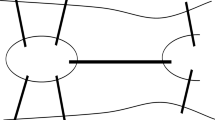Abstract
According to quasi-empiricism, mathematics is very like a branch of natural science. But if mathematics is like a branch of science, and science studies real objects, then mathematics should study real objects. Thus a quasi-empirical account of mathematics must answer the old epistemological question: How is knowledge of abstract objects possible? This paper attempts to show how it is possible.
The second section examines the problem as it was posed by Benacerraf in ‘Mathematical Truth’ and the next section presents a way of looking at abstract objects that purports to demythologize them. In particular, it shows how we can have empirical knowledge of various abstract objects and even how we might causally interact with them.
Finally, I argue that all objects are abstract objects. Abstract objects should be viewed as the most general class of objects. The arguments derive from Quine. If all objects are abstract, and if we can have knowledge of any objects, then we can have knowledge of abstract objects and the question of mathematical knowledge is solved. A strict adherence to Quine's philosophy leads to a curious combination of the Platonism of Frege with the empiricism of Mill.
Similar content being viewed by others
References
Aczel, Peter: 1988,Non-Well-Founded Sets, Center for the Study of Language and Information (CSLI) Lecture Notes, Stanford.
Ambrose, Alice: 1966, ‘Proof and the Theorem Proved’, in Alice Ambrose,Essays in Analysis, George Allen and Unwin Ltd., London, pp. 13–25.
Benacerraf, Paul: 1965, ‘What Numbers Could Note Be’,Philosophical Review 74, 47–73.
Benacerraf, Paul: 1973, ‘Mathematical Truth’,Journal of Philosophy 70, 661–80.
Benacerraf, Paul and Hilary Putnam (eds.): 1983,Philosophy of Mathematics, 2d ed., Cambridge University Press, Cambridge.
Chihara, Charles S.: 1973,Ontology and the Vicious Circle Principle, Cornell University Press, Ithaca.
Davis, Philip and Reuben Hersh: 1981,The Mathematical Experience, Birkhäuser, Boston.
Dummett, Michael: 1978, ‘Truth’, in hisTruth and Other Enigmas, Harvard University Press, Cambridge.
Field, Hartry: 1980,Science Without Numbers: a Defense of Nominalism, Basil Blackwell, Oxford.
Field, Hartry: 1989,Realism, Mathematics and Modality, Basil Blackwell, Oxford.
Frege, Gottlob: 1950,The Foundations of Arithmetic, trans. J. L. Austin, Basil Blackwell, Oxford.
Frege, Gottlob: 1956, ‘The Thought: A Logical Inquiry’, trans. M. Quinton,Mind 65, 289–311.
Gödel, Kurt: 1944, ‘Russell's Mathematical Logic’, in Paul A. Schilpp (ed.),The Philosophy of Bertrand Russell, Northwestern University Press, Evanston, IL.
Goodman, Nicolas: 1990a, ‘Mathematics as Natural Science’,Journal of Symbolic Logic 55, 182–93.
Goodman, Nicolas: 1990b, ‘Modernizing the Philosophy of Mathematics’, AAAS Symposium, New Orleans.
Kitcher, Philip: 1978, ‘The Plight of the Platonist’,Noûs 12, 119–36.
Kitcher, Philip: 1983,The Nature of Mathematical Knowledge, Oxford University Press, Oxford.
Lakatos, Imre: 1976,Proofs and Refutations, Cambridge University Press, Cambridge.
Lakatos, Imre: 1978, ‘A Renaissance of Empiricism in the Recent Philosophy of Mathematics’, in hisPhilosophical Papers, Cambridge University Press, Cambridge.
Lam, Clement: 1988, quoted in theNew York Times, 20 Dec., pp. C5, C17.
Lehman, H.: 1979,Introduction to the Philosophy of Mathematics, Rowan and Littlefield, Totowa, NJ.
Maddy, Penelope: 1980, ‘Perception and Mathematical Intuition’,Philosophical Review 89, 163–96.
Maddy, Penelope: 1988a, ‘Believing the Axioms I’ and ‘Believing the Axioms II’,Journal of Symbolic Logic 53, 481–511, 735–64.
Maddy, Penelope: 1988b, ‘The Roots of Contemporary Platonism’,Journal of Symbolic Logic 54, 1121–41.
Peterson, Ivars: 1990, ‘Recipes for Artificial Realities’,Science News 138, 328–29.
Putnam, Hilary: 1975, ‘What is Mathematical Truth’, in hisPhilosophical Papers, Cambridge University Press, Cambridge.
Putnam, Hilary: 1981,Reason, Truth and History, Cambridge University Press, Cambridge.
Quine, Williard Van Orman: 1960,Word and Object, MIT Press, Cambridge, MA.
Quine, Williard Van Orman: 1969,Ontological Relativity and Other Essays, Columbia University Press, New York.
Quine, Willard Van Orman: 1976, ‘Whither Physical Objects?’, inBoston Studies in the Philosophy of Science XXXIX, 497–504.
Resnik, Michael: 1975, ‘Mathematical Knowledge and Pattern Cognition’,Canadian Journal of Philosophy 5, 25–34.
Resnik, Michael: 1989a, ‘A Naturalized Epistemology for a Platonist Mathematics’,Philosophica 43, 7–30.
Resnik, Michael: 1989b, ‘Computers and Mathematical Empiricism’,Philosophical Topics 18, 129–44.
Russell, Bertrand: 1973, ‘The Regressive Method of Discovering the Premises of Mathematics’ (1907), in Douglas Lackey (ed.),Essays in Analysis, George Braziller, New York, pp. 272–83.
Stroud, Barry: 1990, ‘Quine's Physicalism’, in Robert B. Barrett and Roger Gibson (eds.),Perspectives on Quine, Basil Blackwell, Oxford, pp. 321–33.
Tymoczko, Thomas: 1979, ‘The Four-Color Problem and Its Philosophical Significance’,Journal of Philosophy 76, 57–83.
Tymoczko, Thomas: 1981, ‘Computer Use to Computer Proof’,Two Year College Mathematics Journal 12, 120–25.
Tymoczko, Thomas (ed.): 1985,New Directions in the Philosophy of Mathematics, Birkhäuser, Boston.
Van Bendegem, Jean Paul: 1987,Finite, Empirical Mathematics: Outline of a Model, Rijksuniversiteit Gent, Gent.
Whitney, H. and W. T. Tutte: 1975, ‘Kempe Chains and the Four Color Problem’, inStudies in Graph Theory, Part II, Mathematical Association of America, Providence, RI.
Author information
Authors and Affiliations
Additional information
This paper is a substantially rewritten version of a paper presented to the American Association for the Advancement of Science Annual Meeting, at New Orleans, in 1990. The ideas in it were heavily influenced by the writings of Nicolas Goodman and Michael Resnik especially, and of Philip Kitcher and Penelope Maddy. The paper benefitted enormously from suggestions and criticism by Michael Resnik, the Five-College Propositional Attitude Task Force, and especially Sam Mitchell and Jane Braaton. Both of the latter are dedicated materialists with no sympathy for the main thesis of this paper. Fortunately, they had some sympathy for the author and saved him from many errors.
Rights and permissions
About this article
Cite this article
Tymoczko, T. Mathematics, science and ontology. Synthese 88, 201–228 (1991). https://doi.org/10.1007/BF00567746
Issue Date:
DOI: https://doi.org/10.1007/BF00567746



